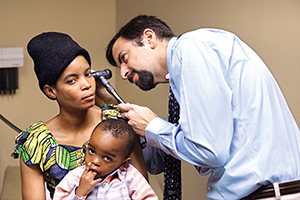The five children crowded around the monitor, munching on snacks and intently watching the baby squirming in their mother's womb. The parents were just as transfixed.

Dr. Maurice Henein examines Byaduria Djeffe, 29, of Indianapolis, at the St. Vincent Refugee Clinic. The monthly clinic is housed at the St. Vincent Joshua Max Simon Primary Care Center. Djeffe holds her son, Ahade.
It was the family's first exposure to prenatal ultrasound, a procedure common in prenatal care in the U.S. Refugees from Myanmar (formerly Burma) in Southeast Asia, they were getting their first medical checkups in America at the St. Vincent Joshua Max Simon Primary Care Center at St. Vincent Indianapolis, a member of Ascension, the largest not-for-profit health system in the U.S.
"The family kept staring at the image, like they were watching a movie," said Amanda Santana, a refugee caseworker. "The doctor explained what they were seeing, but their reaction was almost disbelief. They were amazed to see how little a child can be."
The physician was Dr. Maurice Henein, a faculty member of the family medicine residency program at St. Vincent and founder of the St. Vincent Refugee Clinic at the hospital's primary care clinic. One day each month, Henein and one or more of the residents provide medical care to refugees who are being resettled in Indianapolis.
Global health at home
Exodus Refugee Immigration, where Santana directs client services, is one of two local resettlement agencies that work with the St. Vincent Refugee Clinic. The other is Catholic Charities Indianapolis. Exodus and Catholic Charities have federal contracts to resettle refugees. Their services include helping them to find housing, employment, food assistance and legal services. And, of course, medical care.
Henein said the clinic sees about 100 patients annually through referrals from the two agencies. The refugee clinic then offers the primary care clinic to be the refugees' medical home for any follow-ups.
Henein said many of the people who come to the refugee clinic haven't seen a doctor for years. Residents and other caregivers at the primary care clinic benefit from the experience of treating refugees. He said 10 of the hospital's 29 family medicine residents are working on an emphasis in global health to treat underserved people, both at home and abroad.
"These patients need special care," Henein said. "Many of us sometimes think of serving people outside our community, but the world is coming to our own doorsteps. This is a chance to help a population that has gone through tremendous suffering."
Resettlement community
Henein said most of the people the refugee clinic serves are from Myanmar, largely because Indianapolis has become one of the biggest resettlement areas in the country for Burmese. Most of these immigrants have lived for years in refugee camps in Thailand and Malaysia before being allowed to move to America.
The clinic also has served refugees from other countries, including the Democratic Republic of Congo, Afghanistan and Bhutan, a small Asian nation, not adjacent to, but northwest of Myanmar.
Henein and other caregivers communicate with the refugees through interpreters whose help usually is arranged through Exodus and Catholic Charities. On follow-up appointments, clinicians can work through telephone translating services as necessary.
Henein said many of the refugees are younger adults with children. He said common medical conditions include hepatitis, post-traumatic stress disorder and high blood pressure.
Refugees are covered by Medicaid for at least eight months after their arrival in the U.S. Henein said the primary care clinic across the street from St. Vincent Indianapolis has been able to absorb any additional costs of treating refugees without much difficulty. He said the clinic coordinates with the local public health department to avoid duplication in providing vaccines and other basic services.
Safety in numbers
The people who are treated at the St. Vincent Refugee Clinic tend to live in the north area of Indianapolis, where the hospital is located. Santana said one of the many things she likes about the clinic is that many doctors, residents and nurses care for the refugees, not just one doctor or nurse.
"The Burmese come from a dictatorship. They have never had much medical care," she said. "So when they see multiple people gathering around and helping them, it makes them feel more comfortable and trusting. They can feel safe."
Henein, 39, studied international health during his own residency at the University of Cincinnati. The married father of three began his work with refugees while working at the Raphael Health Center, a federally qualified clinic in east Indianapolis. Once he joined St. Vincent, he worked with the hospital and the resettlement agencies to establish the refugee clinic there. It opened in 2012.
Henein said he is motivated by his Christian faith. He said few of the refugees are Christian, but some will ask him or other caregivers to pray with them. "We can show the love of Christ through our actions, whether we say His name or not," Henein said. "Our patients have been through terrible struggles and challenges. We can show them Jesus by giving them excellent medical care and an excellent medical home."
Said Santana, "We need more Dr. Heneins in our world."
Copyright © 2014 by the Catholic Health Association
of the United States
For reprint permission, contact Betty Crosby or call (314) 253-3477.